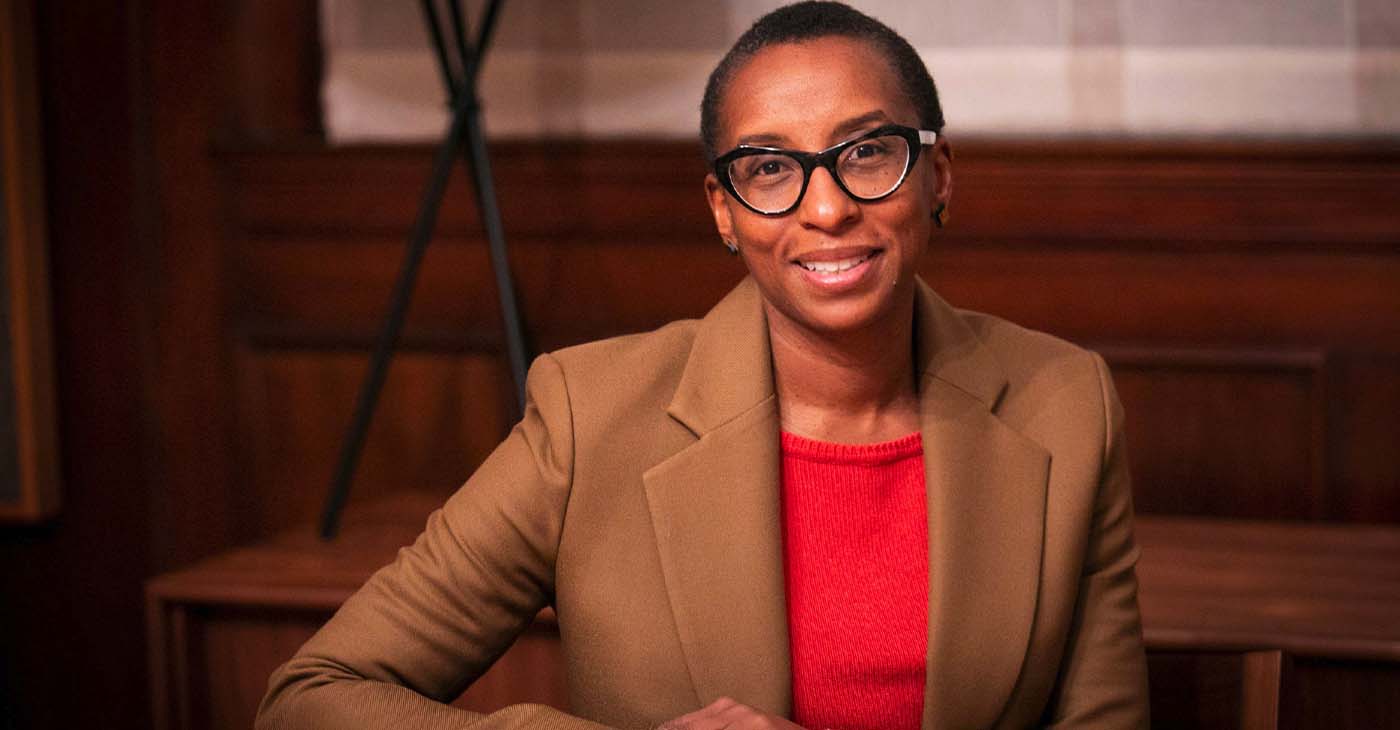Commentary
Commentary: Harvard’s First Black Female President Survives New Anti-Diversity Battle
If you haven’t realized it yet, that congressional hearing last week that continues to make news wasn’t about solving antisemitism in America in the shadow of the Israel/Hamas war. That was the given pretext for the hearing, but it really served as a platform for an outright attack by right-wing MAGA-types on the thing they believe has destroyed higher education – and all of society—in the last 30 years. What would that be? Diversity, of course, and the undoing of racial discrimination in the spirit of the Civil Rights Act.

By Emil Guillermo
If you haven’t realized it yet, that congressional hearing last week that continues to make news wasn’t about solving antisemitism in America in the shadow of the Israel/Hamas war.
That was the given pretext for the hearing, but it really served as a platform for an outright attack by right-wing MAGA-types on the thing they believe has destroyed higher education – and all of society—in the last 30 years.
What would that be?
Diversity, of course, and the undoing of racial discrimination in the spirit of the Civil Rights Act.
With that single word, “diversity,” comes all that detractors believe has crippled our country starting with our colleges and universities.
It includes everything from admissions, to hiring, and extends to a curriculum that has seen the emergence of race, gender, and equity studies. It serves to make everyone more aware of issues heretofore ignored in society in general.
What better way to bring about its reversal but in a high-profile congressional hearing attacking three elite university presidents?
The main instigator was fourth ranking Republican, Rep. Elise Stefanik of New York, a Donald Trump acolyte, and herself an Ivy League-educated Marjorie Taylor Green wannabe.
Stefanik is a Trump enabler who voted to invalidate the 2020 election and has maintained the “Big Lie” on election fraud.
That puts her low on any sane person’s credibility scale –unless you’re Donald Trump.
At the hearing, Stefanik in mini-authoritarian mode, was given extra time by fellow Republicans who yielded to her so she could wail at the college presidents demanding they give yes/no answers on complex matters of free speech and discrimination.
It was textbook political outrage as performance and a good example of why politics is sometimes called “show business for ugly people.”
Still, it’s hard to believe that elite college presidents, who themselves oversee sometimes treacherous academic office politics, could have been taken by surprise. Surely, they’ve seen Congressional hearings run by MAGA loyalists like Jim Jordan (R.-Ohio)?
But when Penn’s Elizabeth Magill, Harvard’s Claudine Gay, and MIT’s Sally Kornbluth came to Congress they just didn’t seem to have a clue they were being teed up by the conservative right.
They thought it was a serious inquiry into antisemitism and responded as such. They were going for nuance and were reserved when asked if calls for genocide against Jews harassment under university policy?
Yes, or no?
The presidents didn’t want to respond to hypotheticals. They said it depends on the context.
And that’s when they were bullied, harangued and soundbited.
How many people were surprised to see a Black woman among the three? That would be Claudine Gay, African American Studies scholar, and the first African American to be president of Harvard.
But she really stood for all of us.
Despite more than five hours of hearings, most people only saw the micro-clips showing the three presidents respond in a collegial, legalistic way. They were soft-spoken and reasonable, respectful of the inquiry. They did not match the volume, ire, and fake passion of Stefanik.
Good enough in a fair fight. But this was not that. The presidents failed to understand that hearings exist for members of Congress to demagogue, beat up on their invited guests, all while the cameras roll, creating viral clips for their own re-election campaigns.
Stefanik got the newsclips she wanted on every major network. But it opened an old wound about America’s reckoning on race. It made everyone question it.
Over the weekend, the key takeaway wasn’t that rising anti-Semitism was bad in society or on campus. Indeed, one major cable network suggested the hearings showed why the public has lost faith in higher ed, claiming it has become home of dogmatic ideology and social engineering, not academic merit.
A fellow committee member Mark Takano (D-Calif.) could see through it. He told the Harvard Crimson the Republicans “were not really interested in the topic of antisemitism and antisemitism on campus.” Rather, Takano, thought the Republicans were playing divisive MAGA-politics.
“My own sense is that the Republicans are spring-loaded to enact a narrative that universities are bastions of liberal progressives,” Takano told the college newspaper. “They wanted to present an opportunity for their members to portray universities in a certain way.”
He was also critical of Stefanik whom he observed as taking a “hard turn to the right.”
But Stefanik’s stunt appears to be working.
While MIT President Sally Kornbluth has received some support on her campus, Penn’s President Magill was forced to resign over the weekend.
Harvard’s Gay apologized for her performance on Friday but was still under some pressure to resign. To counter, faculty members circulated a letter of support on Sunday. But there’s also been some public discussion questioning whether as an African America woman Gay was even qualified for the job.
Some conservative outlets going into her scholarly work exposed minor examples of plagiarism, anathema. On Tuesday Harvard’s board voted to “unanimously stand in support of President Gay.”
All this from an inquiry into fighting antisemitism. Instead, the hearing exposed the bitterness and resentment that some still have over a move toward diversity, equity, and inclusion (DEI). It is a staple MAGA argument.
Stefanik’s stunt worked so well, expect more of it.
Yes, we’re all against antisemitism. But as we see, in 2023, some people hate diversity, equity and inclusion efforts, even more.
Emil Guillermo is a veteran Northern California journalist and commentator. He does a micro-talk show on YouTube.com/@emilamok1
Commentary
Opinion: Lessons for Current Student Protesters From a San Francisco State Strike Veteran
How the nation’s first College of Ethnic studies came about, bringing together Latino, African American and Asian American disciplines may offer some clues as to how to ease the current turmoil on American college campuses over the Israel-Hamas war. After the deadline passed to end the Columbia University encampment by 2 p.m. Monday, student protesters blockaded and occupied Hamilton Hall in a symbolic move early Tuesday morning. Protesters did the same in 1968.

By Emil Guillermo
How the nation’s first College of Ethnic studies came about, bringing together Latino, African American and Asian American disciplines may offer some clues as to how to ease the current turmoil on American college campuses over the Israel-Hamas war.
After the deadline passed to end the Columbia University encampment by 2 p.m. Monday, student protesters blockaded and occupied Hamilton Hall in a symbolic move early Tuesday morning.
Protesters did the same in 1968.
That made me think of San Francisco State University, 1968.
The news was filled with call backs to practically every student protest in the past six decades as arrests mounted into hundreds on nearly two dozen campuses around the country.
In 1970, the protests at Kent State were over the Vietnam War. Ohio National Guardsmen came in, opened fire, and killed four students.
Less than two weeks later that year, civil rights activists outside a dormitory at Jackson State were confronted by armed police. Two African American students were killed, twelve injured.
But again, I didn’t hear anyone mention San Francisco State University, 1968.
That protest addressed all the issues of the day and more. The student strike at SFSU was against the Vietnam war.
That final goal was eventually achieved, but there was violence, sparked mostly by “outside agitators,” who were confronted by police.
“People used the term ‘off the pigs’ but it was more rally rhetoric than a call to action (to actually kill police),” said Daniel Phil Gonzales, who was one of the strikers in 1968.
Gonzales, known as the go-to resource among Filipino American scholars for decades, went on to teach at what was the positive outcome of the strike, San Francisco State University’s College of Ethnic Studies. It’s believed to be the first of its kind in the nation. Gonzales recently retired after more than 50 years as professor.
As for today’s protests, Gonzales is dismayed that the students have constantly dealt with charges of antisemitism.
“It stymies conversation and encourages further polarization and the possibility of violent confrontation,” he said. “You’re going to be labeled pro-Hamas or pro-terrorist.”
That’s happening now. But we forget we are dealing not with Hamas proxies. We are dealing with students.
Gonzales said that was a key lesson at SF State’s strike. The main coalition driving the strike was aided by self-policing from inside of the movement. “That’s very difficult to maintain. Once you start this kind of activity, you don’t know who’s going to join,” he said.
Gonzales believes that in the current situation, there is a patch of humanity, common ground, where one can be both pro-Palestine and pro-Israel. He said it’s made difficult if you stand against the belligerent policies of Benjamin Netanyahu. In that case, you’re likely to be labeled antisemitic.
Despite that, Gonzales is in solidarity with the protesters and the people of Gaza, generally. Not Hamas. And he sees how most of the young people protesting are in shock at what he called the “duration of the absolute inhumane kind of persecution and prosecution of the Palestinians carried out by the Israeli government.”
As a survivor of campus protest decades ago, Gonzales offered some advice to the student protesters of 2024.
“You have to have a definable goal, but right now the path to that goal is unclear,” he said.
About the Author
Emil Guillermo is a journalist and commentator. A veteran newsman in TV and print, he is a former host of NPR’s “All Things Considered.”
Activism
Oakland Post: Week of May 1 – 7, 2024
The printed Weekly Edition of the Oakland Post: Week of May 1 – 7, 2024

To enlarge your view of this issue, use the slider, magnifying glass icon or full page icon in the lower right corner of the browser window. ![]()
Activism
Oakland Post: Week of April 24 – 30, 2024
The printed Weekly Edition of the Oakland Post: Week of April 24 – 30, 2024

To enlarge your view of this issue, use the slider, magnifying glass icon or full page icon in the lower right corner of the browser window. ![]()
-

 Community3 weeks ago
Community3 weeks agoFinancial Assistance Bill for Descendants of Enslaved Persons to Help Them Purchase, Own, or Maintain a Home
-

 City Government5 days ago
City Government5 days agoCourt Throws Out Law That Allowed Californians to Build Duplexes, Triplexes and RDUs on Their Properties
-

 Business3 weeks ago
Business3 weeks agoV.P. Kamala Harris: Americans With Criminal Records Will Soon Be Eligible for SBA Loans
-

 Activism2 weeks ago
Activism2 weeks agoOakland Post: Week of April 24 – 30, 2024
-

 Activism4 weeks ago
Activism4 weeks agoOakland Post: Week of April 10 – 16, 2024
-

 Community3 weeks ago
Community3 weeks agoAG Bonta Says Oakland School Leaders Should Comply with State Laws to Avoid ‘Disparate Harm’ When Closing or Merging Schools
-

 Community3 weeks ago
Community3 weeks agoRichmond Nonprofit Helps Ex-Felons Get Back on Their Feet
-

 Community3 weeks ago
Community3 weeks agoOakland WNBA Player to be Inducted Into Hall of Fame




















































